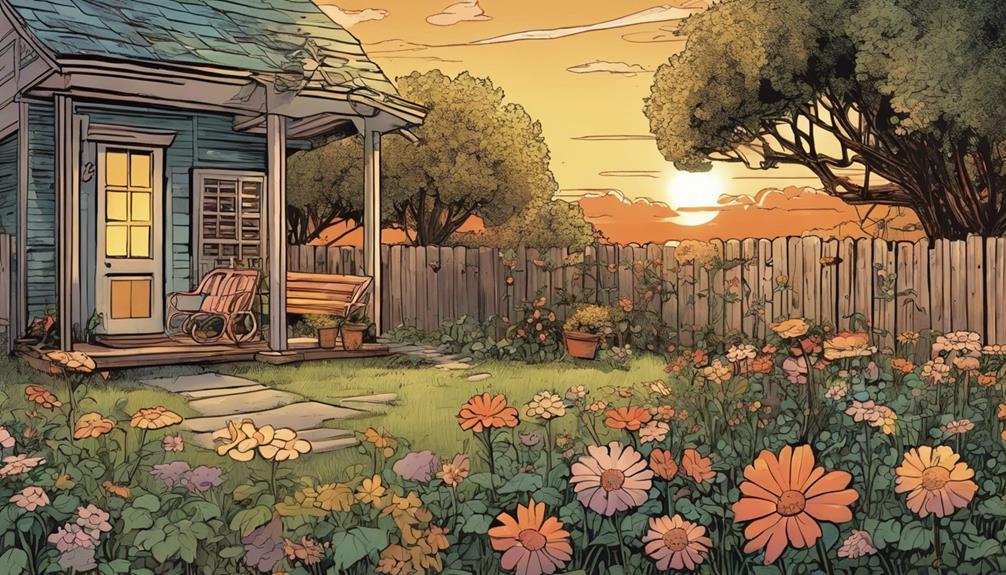Explore the Bible's view on flowers for a deeper understanding of their symbolic meaning. Discover how flowers in biblical texts represent beauty, divine care, and God's provision through nature. From King Solomon's admiration to Jesus' teachings, flowers symbolize purity, simplicity, and the temporary nature of earthly concerns. The significance of flowers in biblical teachings spans interpretations from early church leaders to Pope Francis today, reflecting on God's love and provision. Uncover the rich symbolism and spiritual insights behind flowers in the Bible to grasp the profound messages they convey.
Key Takeaways
- Flowers in the Bible symbolize beauty, purity, and God's care.
- Biblical passages use flowers to convey God's provision and carefree nature.
- Flowers like lilies and roses are admired for their beauty in biblical texts.
- The symbolic significance of flowers in the Bible reflects divine messages and virtues.
- Nature's depiction in the Bible, including flowers, reveals spiritual truths about God's glory and care.
Biblical Texts
Exploring biblical texts sheds light on the importance of flowers in scripture. In the Bible, flowers are often used as symbols of beauty, glory, and divine care.
For instance, in the Song of Solomon, King Solomon's admiration for the beauty of lilies and roses symbolizes the beauty and purity of his beloved.
The passage 'Consider the lilies of the field' found in the New Covenant, particularly in Luke 12:27 and the King James Version, emphasizes the carefree nature of lilies, contrasting it with human worries. This passage serves as a reminder of God's provision and care for His creation, encouraging believers to trust in His providence.
While the King James Version presents this passage in a poetic manner, the World English Bible offers a more straightforward translation.
Additionally, the Novum Testamentum Graece presents the text in its original Greek form, providing insight into the nuances of the language used in discussing the importance of flowers in biblical teachings.
Interpretation
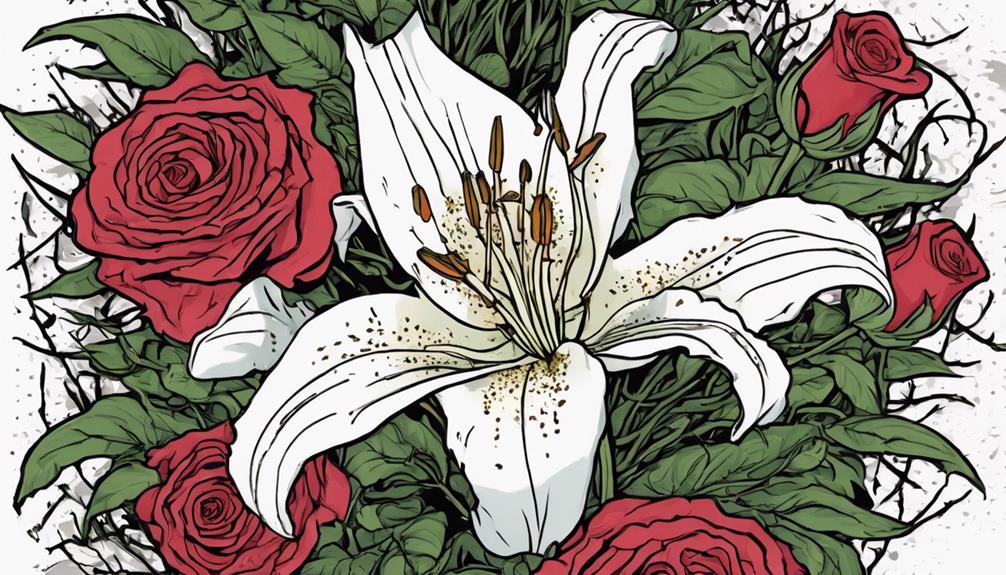
You might wonder how to understand Jesus' teachings using flowers and Pope Francis' unique viewpoint on God's care for all creation.
Exploring the interpretation behind these biblical references can shed light on their deeper meanings and implications for spiritual reflection.
Let's uncover the significance of these floral insights to gain a richer understanding of the biblical text.
Jesus' Floral Teachings
When interpreting Jesus' floral teachings, one can discern His deep reverence for nature and God's provision through the symbolic use of lilies. Jesus often used flowers, particularly lilies, to convey profound spiritual truths.
Here are some key aspects to contemplate:
- God's Care: Jesus references lilies in the Bible to illustrate how they grow without toiling or spinning, highlighting God's care for even the simplest of His creations.
- Symbolic Meaning: The lily symbolizes purity and beauty in the Bible, reflecting the divine perfection and grace of God's provision.
- Contrasting Human Worries: By pointing to the lilies as an example, Jesus emphasizes the futility of worrying about material needs, encouraging trust in God's abundant provision.
- Simplicity and Beauty: Through the imagery of lilies, Jesus showcases the natural beauty and simplicity of God's creation, inviting his followers to appreciate and learn from the flowers' carefree existence.
Pope Francis' Perspective
Pope Francis interprets Jesus' reference to lilies as a poignant reminder of God's care and provision for all of creation. He sees lilies as beloved creations, offering a spiritual lesson on trust in God's love and providence.
By highlighting the beauty and simplicity of lilies, Pope Francis underscores the importance of appreciating God's handiwork in nature. Through Jesus' comparison of lilies to human anxieties, the pontiff encourages trust in God's care over worrying about life's uncertainties.
Pope Francis' perspective on lilies serves as a call to deepen one's connection with nature and to rely on God's loving care. By focusing on the beloved lilies, he emphasizes the need for faith and trust in God's provision, drawing attention to the profound spiritual lessons that can be gleaned from these delicate flowers.
Cultural Impact
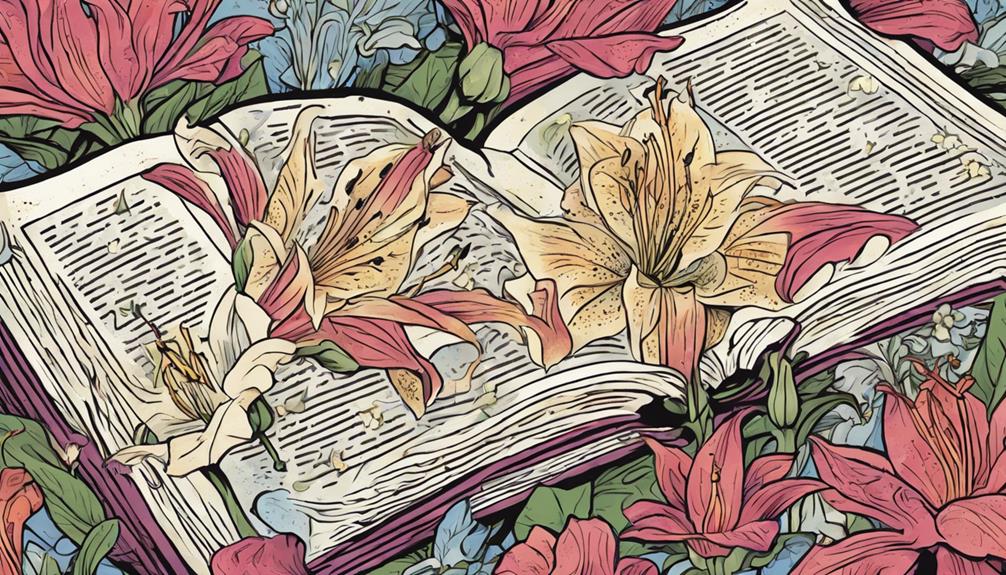
The biblical reference of pondering the lilies of the field has left a significant cultural imprint, influencing various forms of artistic expression. This timeless verse has been commonly referenced in literature and art, making its way into the works of renowned authors like Keats and Wodehouse.
In addition, the phrase has been humorously applied to critique the idle rich, adding a satirical twist to its interpretation. Its impact extends beyond the written word, as movies like 'Lilies of the Field' and TV shows like 'Star Trek' have quoted the verse about lilies, showcasing its relevance in visual media.
Besides, the verse has transcended literature and screen to inspire songs that echo its floral faith message, resonating with audiences through melodies and lyrics. This cultural integration of the biblical verse reflects the enduring power of its interpretation in shaping artistic narratives and expressions.
Commentary From Church Fathers
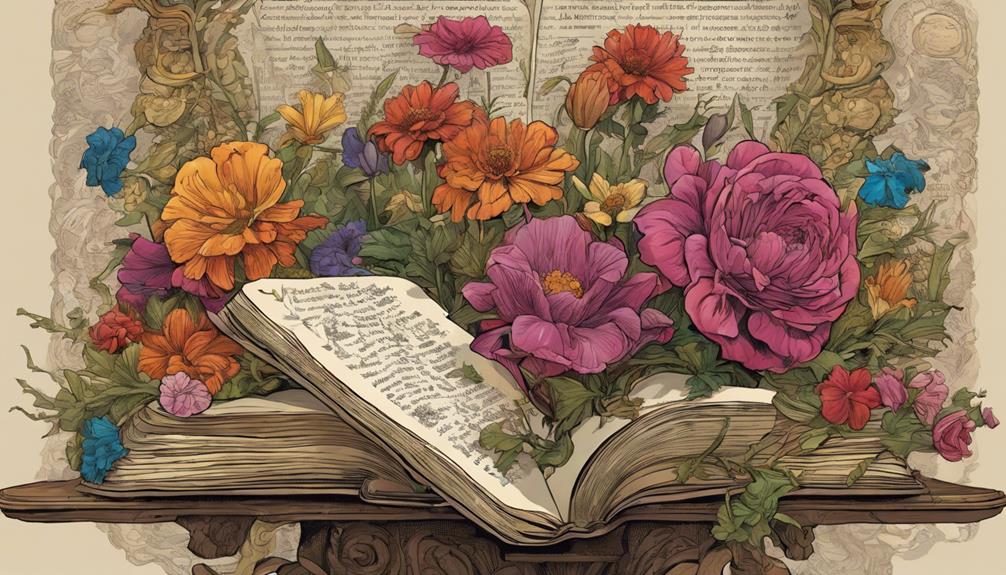
Church Fathers like Chrysostom, Augustine, and Jerome offer valuable insights on the symbolic significance of flowers in biblical passages. Their ancient interpretations provide diverse perspectives on God's providence, care, and creation as depicted through the beauty of lilies and other flowers.
As you explore their commentary, you'll uncover a rich tapestry of spiritual wisdom woven into the delicate petals of these natural wonders.
Church Fathers' Insights
Insights from early Christian leaders shed light on the significance of flowers in biblical teachings. The Church Fathers' interpretations offer valuable perspectives on God's care and the beauty of flowers:
- Chrysostom's Emphasis: Chrysostom highlights God's providence in the creation of flowers, emphasizing God's care for both the beautiful lilies and human needs.
- Augustine's Caution: Augustine warns against allegorizing the examples of birds and lilies, urging a balanced interpretation of verses.
- Pseudo-Chrysostom's Reflection: Pseudo-Chrysostom points out the divine care evident in the creation of flowers, underscoring the intricate design as a reflection of God's creation.
- Jerome's Admiration: Jerome praises the unmatched beauty of flowers as a testimony to God's creation, appreciating the splendor as a manifestation of God's creativity.
These varied insights from Church Fathers offer a rich tapestry of understanding regarding the significance of flowers in the Bible and God's providential care displayed through His creation.
Ancient Interpretations
Explore how ancient Church Fathers, including Chrysostom, Augustine, Pseudo-Chrysostom, and Jerome, provided profound insights into the significance of flowers in biblical teachings.
Chrysostom and Augustine highlighted the Lord's care for nature, emphasizing the beauty and transience of flowers.
Pseudo-Chrysostom praised God's providence in the creation of flowers, while Jerome marveled at the glorious beauty of floral creations as a reflection of God's handiwork.
These Church Fathers cautioned against overemphasizing the allegorical interpretations of flowers mentioned in biblical passages, such as the lilies of the field and the birds of the air. They underscored the importance of recognizing the symbolic significance of flowers without detracting from their inherent beauty and role in God's creation.
Through their interpretations, they shed light on the profound messages conveyed in biblical references to flowers, reminding believers of the intricate design and care with which God has adorned the earth.
Biblical Commentary Perspectives
In their commentaries on biblical passages, ancient Church Fathers like Chrysostom, Augustine, Pseudo-Chrysostom, and Jerome offer unique perspectives on the significance of flowers. Here are some insights they provide:
- Chrysostom emphasizes God's care for both the beautiful lilies and human needs, highlighting the connection between God's provision and the splendor of flowers.
- Augustine warns against overly allegorizing examples of birds and lilies, urging a balanced interpretation that respects the natural beauty of God's creation.
- Pseudo-Chrysostom underscores the role of God's providence in the creation of flowers, showcasing how even the intricate details of flora reflect divine care and design.
- Jerome praises the unparalleled beauty of flowers as a tribute to God's creation, pointing to the diverse array of blooms as evidence of God's artistic handiwork in nature.
These Church Fathers offer diverse perspectives on how flowers symbolize God's care, provision, and the inherent beauty found in His creation.
Biblical References to Flowers
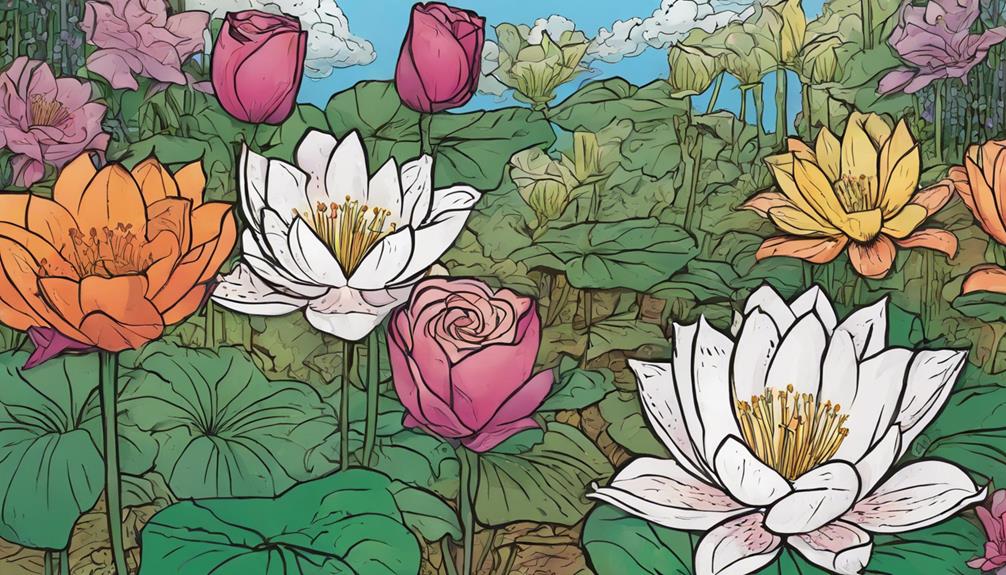
Within the pages of the Bible, numerous references to flowers can be found, each carrying symbolic significance and spiritual meaning. These references provide insight into the beauty, fragility, and the love of God represented by flowers. Specific types such as the Rose of Sharon and Lily of the Valley are highlighted, showcasing the temporary nature of life and the transient aspects of worldly things. Flowers of the field, often mentioned in biblical texts, serve as poignant reminders of the fleeting nature of human existence and the deeper spiritual symbolism they carry. The symbolic meanings of Christ-like flowers in the Bible offer profound insights into divine messages and virtues.
| Flower | Symbolism |
|---|---|
| Rose of Sharon | Beauty and Divine Love |
| Lily of the Valley | Purity and Renewal |
| Flowers of the Field | Temporary Nature |
| Christ-like flowers | Spiritual Virtues |
Nature's Symbolism in the Bible
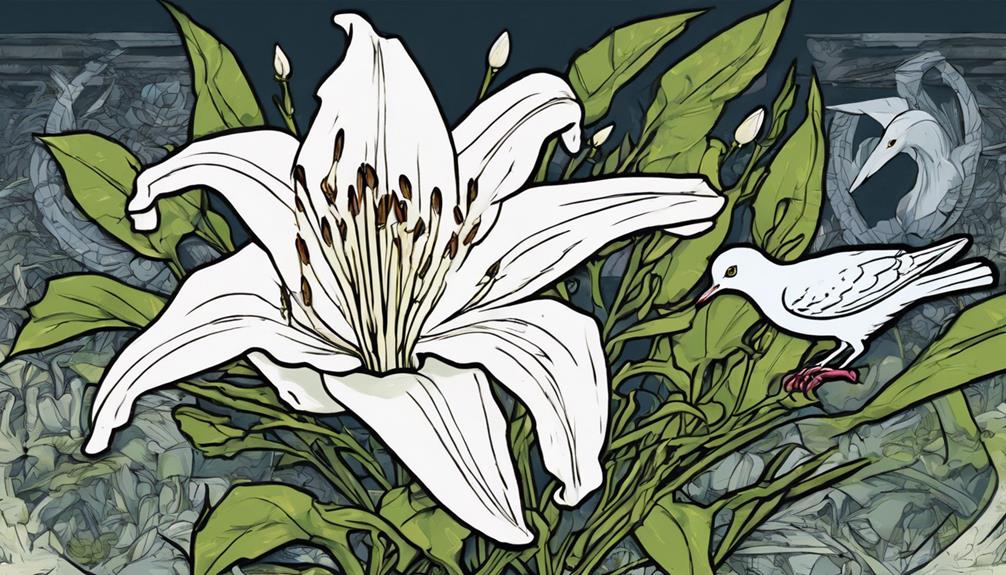
Let's shift our focus to the symbolic representations of nature in the Bible, highlighting the profound spiritual lessons drawn from its elements.
- The flower of the field symbolizes the glory of the Lord, showcasing His divine creativity and beauty in Psalm 104:24.
- In Hosea 14:5, the imagery of a lily among Israel signifies growth and strength, emphasizing how God's people will blossom abundantly.
- Isaiah 35:1 prophesies that the desert shall rejoice and blossom like a flower, illustrating the transformative power of God's creation in bringing joy and renewal.
- Psalm 23:1-3 compares the Lord to a shepherd leading beside still waters, a serene image reflecting the comforting and nurturing presence of God among the young.
Through these symbolic representations of nature, the Bible conveys profound spiritual truths, encouraging faith in God's provision, growth, and transformative power in the lives of His people.
What significance do flowers have in the Bible and how are they referenced in scripture?
In the Bible, flowers symbolize beauty, growth, and renewal. They are referenced in various Bible verses with flowers, such as Matthew 6:28, where Jesus mentions how lilies don’t labor or spin, yet Solomon in all his glory was not arrayed like one of these. This signifies God’s care and provision for his creation.
Conclusion
So next time you see a beautiful flower, remember the profound significance they hold in the Bible.
How can we not marvel at the intricate design and symbolism that God has woven into even the smallest of creations?
Flowers aren't just a feast for the eyes, but a reminder of the divine presence and care that surrounds us every day.





